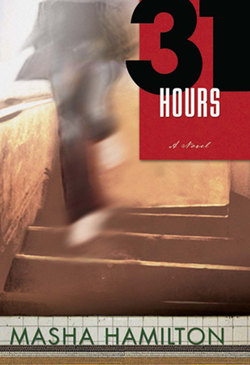Читать книгу 31 Hours - Masha Hamilton - Страница 7
На сайте Литреса книга снята с продажи.
NEW YORK: 1:44 A.M. MECCA: 9:44 A.M.
ОглавлениеA wolf’s howl. But more shrill, more prolonged. Carol sat fully upright, an inhale caught in her chest, before she realized there was, of course, no rabid wolf dodging Manhattan traffic. It was only winter’s wind slicing past her eleventh-floor apartment window with enough ferocity to rouse her. Then she grasped, in quick succession, that she’d been half-awake before the noise began, that her stomach hurt, and that her mind was filled with Jonas. Her son. Her wild-haired precious. When he was tiny, on a frenzied night like this, he would have snuggled with her in this very bed, bare toes pressing against her leg. Now he extended over six feet, and though he hugged, he didn’t snuggle. God, where had those days gone?
More important: Where was he now?
She lay back down, reached to pull a pillow close, and smoothed her forehead with a hand as if wiping dust from a table. She wondered if she could will herself back to sleep but doubted it. Her most successful years of slumber stretched from Jonas’s birth through his toddlerhood, when the basics felt simple and pure and her arms had been full of husband and baby, potter’s clay and homemade bread. Through the remaining, darker days of marriage, divorce, and the occasional lover, erratic sleep became the status quo. Still, whenever she awakened in the wee hours, she wanted nothing more than to breathe in time with another human body—a desire that pointed to a primitive quality in her, she thought, one not suited to this modern life. At age forty-eight, she still wasn’t used to sleeping alone.
When Jake was already gone and Jonas still a boy, she would sometimes crawl into her young son’s bed, rest a hand on his tummy, and match her breath to his. Often, if her presence woke him—she hadn’t thought of this in years—he would lull himself back to sleep by twirling her hair with his fingers, as if they were joined. He was so small then that air passed through his body at a pace more urgent than soothing. But the rise and fall of his stomach connected her to nothing less than the universe itself. Jonas saved her from facing her own mortality during those long nights. Next to him, imagining herself a kite finally cut free of its string, she slept.
That perfect boy with his drowsy warm scent and hair falling on the pillow like a piece of art. Why hadn’t he returned her calls?
But why should that be such a big deal? At twenty-one, separating from parents and establishing one’s individuality was a desired, even critical, stage. “Differentiation” was the term, wasn’t it? She had to give him space, trust him. That’s what it meant to be the parent of a grown child.
Well, screw differentiation. Screw psychobabble that blurred the particularities of Carol and her son and her mother-intuition. He’d always been so sensitive, before. He would never have wanted her to feel this scared, and if he wouldn’t—or couldn’t—pick up the phone to ease her anxiety now, that only proved it. Something was wrong.
She massaged her scalp for a moment and then squeezed her eyes closed, trying to picture Jonas in his Greenwich Village apartment. She failed. She tried to envision him in a lecture hall at NYU. That didn’t work, either. A hospital bed in Midtown? Sunk to the bottom of the East River?
Oh, God. Night-fed fears; she knew all about them. Keep this up, and shadows would become serial killers hiding beneath the bed. She was as unreasonable as a child awakened from a nightmare, she told herself, but that thought, though reassuring, felt unconvincing. This must be what it meant to worry oneself sick—although this emotion seemed closer to premonition, which made it even more alarming. Simple worry she could dismiss as wisps of weariness-fueled nonsense. Portent was born of concrete facts not yet processed by the conscious mind.
She threw her arm over her face. Be rational, she instructed herself. Put it into words: I am worried because . . .
Because Jonas recently had seemed so troubled. Too vulnerable, too raw, even for him. Too prone to anger that would rise like a wind gust and then die as swiftly. Too distant—perhaps that most of all. The heaviness she’d been feeling in her limbs for days could be dismissed as some delayed empty-nest response. But what if it was caused by something larger? What if her past with her baby, her boy, hadn’t simply evolved as it was supposed to with one’s grown children? What if, somehow, all those moments and memories laid in place like bricks used to build a house had vanished entirely, become dust while she’d been looking the other way?
A pipe moaned in the walls, while out in the hallway the elevator lumbered to life. On the icy streets below, on a night like this, cars careened with vulnerability, bakers lingered close to their ovens, and subways grumbled on their tracks as they rushed young partygoers and workers just off night shifts to their homes. She rolled onto her stomach and buried her nose and mouth in the pillow until she had to turn her cheek to the side to breathe. Breathe, she told herself. Rest, and soften the shoulders, and stop the mind’s seesawing, at least until dawn. Yes, dawn. And then, young adult or not, she would track him down. She would touch his cheek and hug him tight—mother him until he shrugged her off—so the next time night fell, she could hold assurance close to her like a childhood blanket and rest with the vigor of the innocent and the blessed.
